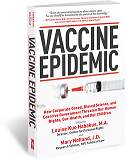
Guest Post: Crack Down on Those Who Don’t Vaccinate?: A Response to Art Caplan
by Mary Holland, J.D.
Harvard Law Blogs
Dr. Art Caplan recently posted an editorial, “Liability for Failure to Vaccinate,” on this blog. He argues that those who contract infectious disease should be able to recover damages from unvaccinated people who spread it. If you miss work, or your baby has to go to the hospital because of infectious disease, the unvaccinated person who allegedly caused the harm should pay. Dr. Caplan suggests that such liability is apt because vaccines are safe and effective. He sees no difference between this situation and slip-and-fall or car accidents due to negligence. Arguing that “a tiny minority continue to put the rest of us at risk,” he suggests that public health officials can catch the perpetrators and hold them to account through precise disease tracing.
Dr. Caplan’s assertions to the contrary, vaccines are neither completely safe nor completely effective. In fact, from a legal standpoint, vaccines, like all prescription drugs, are “unavoidably unsafe.” [See, e.g., Bruesewitz v. Wyeth, 562 U.S. __ (2011).] Industry considered its liability for vaccine injury so significant that it lobbied Congress for the 1986 National Childhood Vaccine Injury Act, providing doctors and vaccine manufacturers almost blanket liability protection for injuries caused by federally recommended vaccines. [See Authorizing Legislation.] The liability risk was so serious that the federal government created a special tribunal under the 1986 Act, the Vaccine Injury Compensation Program, to pay the injured. Moreover, the Supreme Court in 2011 decided Bruesewitz v. Wyeth, prohibiting any individual from filing a civil suit for a defectively designed vaccine in any court in the country. Industry’s extraordinary protection against liability for vaccine injury does not correspond with glib statements, like those of Dr. Caplan, that vaccines are safe and effective. On the contrary, the law acknowledges that vaccines cause injury and death to some, with no screening in place to mitigate harm. Dr. Caplan notes that public health officials have “tried to debunk false fears about vaccine safety.” Yet the Institute of Medicine, one the country’s most prestigious health organizations, has acknowledged repeatedly that there are many known vaccine injuries, such as seizures from the measles-mumps-rubella vaccine, anaphylaxis from the meningococcal vaccine, and encephalitis from the varicella vaccine. Even more troubling than the identified injuries is the number of potential vaccine adverse effect relationships for which the evidence is not sufficient to either prove or disprove causality. [Committee to Review Adverse Effects of Vaccines, Institute of Medicine, Adverse Effects of Vaccines: Evidence and Causality (Kathleen Straton et al. eds., 2012).]
Dr. Caplan seems to suggest a peculiarly narrow kind of civil liability, allowing claims only by those who have been vaccinated and become sick against those who lawfully refused vaccination. What if a vaccinated person spreads disease? Presumably, she would bear no liability because she would not have been negligent. Yet vaccinated people do spread disease, as in the case of Tenuto v. Lederle Labs., 907 NYS.2d 441 (2010). Mr. Tenuto, a father, contracted paralytic polio from his infant daughter while changing her diaper after the infant had received the live virus oral polio vaccine. Although the vaccine protected the infant from polio, it exposed her father to disease through viral shedding, causing him severe, lifelong harm. Despite proven causation, industry litigated for over thirty years to avoid paying for the damages that occurred before the 1986 liability protections took effect.
And what if disease breaks out in a highly vaccinated population, with no unvaccinated person to finger? There have been numerous outbreaks of mumps, measles and pertussis with no initial cases traced to unvaccinated individuals. [See, e.g., Nkowane et al, “Measles Outbreak in a Vaccinated School Population: Epidemiology, Chains of Transmission and the Role of Vaccine Failures,” AJPH April 1987, 77, no. 4.] Presumably, Dr. Caplan would argue no liability should inure to industry because the sale of ineffective or defectively designed vaccines does not constitute negligence.
Dr. Caplan’s interest to hold liable families lawfully exercising religious freedom while letting industry have almost complete liability protection seems peculiarly asymmetrical and unjust. Overall, Dr. Caplan seems to suggest an implied duty to vaccinate on all members of society. Yet the legal foundation for such a duty is shaky, as there is no clear analogue in tort or criminal law for a duty to rescue, even if a person may do so at little or no cost to herself. [See, e.g., Ernest J. Weinrib, The Case for a Duty to Rescue, 90 Yale L.J. 247 (1980) (evaluating the case for imposing a duty to rescue).] If the common law has been unwilling to impose a duty to rescue, Dr. Caplan is likely wrong as a matter of law to suggest that civil liability is a viable work-around for limiting religious vaccination exemptions.
New York State law permits people to refuse vaccines for “genuine and sincere religious beliefs.” [N.Y. Pub. Health Law Section 2164(1)(a) (Consol.2011).] The rationale behind this is that some people have deeply held religious and ethical convictions that conflict with vaccination. Freedom of religion is the first civil right in the First Amendment to the U.S. Constitution; it is the bedrock of U.S. law and culture. Similarly, religious tolerance is a cornerstone of New York State’s historic peace and prosperity. The right to affirm a religious objection to vaccination is part of New York’s heritage. To repeal that, or to subvert it through civil liability, would be to unravel some of the bonds that hold together New York’s extraordinarily diverse society.
Concerns about infectious disease outbreaks are real, however. In the event of an outbreak, unvaccinated children must remain home from school until the outbreak subsides. Such lawful quarantines during public health emergencies respect the rights of all, including the unvaccinated.
Despite sharp disagreement about civil liability, on one important point Dr. Caplan and I agree. He notes in his post that “newborns can’t benefit from vaccines.” Dr. Caplan is correct that there is no compelling science suggesting that newborns’ undeveloped immune systems can benefit from vaccination. Given this acknowledgement, I expect that Dr. Caplan agrees that the federal recommendation that newborns receive the hepatitis B vaccine while still in the hospital is unwise. Dr. Caplan appears to agree that the infant hepatitis B vaccine recommendation and its associated mandates are irrational and violate the Constitution’s 14th amendment equal protection and due process clauses. [See Mary Holland, Compulsory Vaccination, the Constitution, and the Hepatitis B Mandate for Infants and Young Children, 12 Yale J. Health Pol’y L. & Ethics 39 (2012).]
Dr. Bernadine Healy, the late Director of the National Institutes of Health, wrote, “Vaccine policy should be the subject of frank and open debate, with no tolerance for bullying. There are no sides – only people concerned for the well-being of our children.” [book cover blurb, Vaccine Epidemic.] In that spirit, I commend Dr. Caplan for initiating an important debate about civil liability, religious freedom and vaccination.
Read the full article here: http://blogs.law.harvard.edu/billofhealth/2013/06/21/guest-post-crack-down-on-those-who-dont-vaccinate-a-response-to-art-caplan
Mary Holland is Research Scholar and Director of the Graduate Legal Skills Program at NYU Law School. She has published articles on vaccine law and policy, and is the co-editor of Vaccine Epidemic: How Corporate Greed, Biased Science and Coercive Government Threaten Our Human Rights, Our Health and Our Children (Skyhorse Publishing, 2012).
Vaccine Epidemic
by Louise Kuo Habakus and Mary Holland J.D.
FREE Shipping Available!




